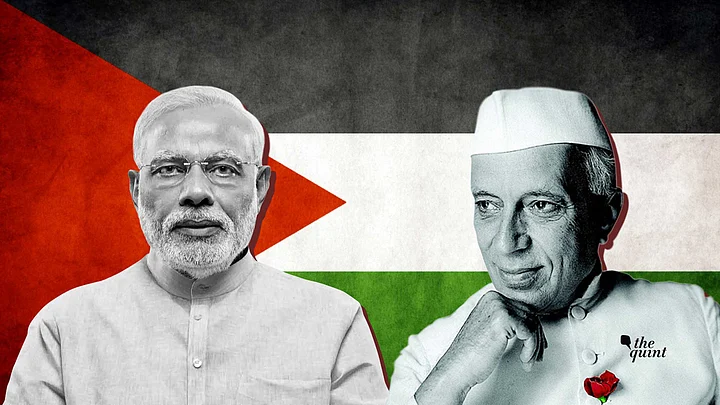Prime Minister Narendra Modi embarked on a state visit to Palestine, Oman and the UAE, on Friday, 9 February. His visit to Palestine, however, assumes special significance.
The Ministry of External Affairs, addressing a press conference on the visit on 5 February, had said that Modi would make a “historic” visit to the conflict-prone Palestine, becoming the “first” Indian prime minister to do so.
People on Twitter started refuting the MEA’s claim, asserting that Jawaharlal Nehru, India’s first PM, was actually the first Indian PM to visit Palestine. Among them was Gaurav Pandhi, who is associated with the Congress, who also shared a photo of Nehru meeting UN Troops in the Gaza Strip in 1960 to make his point.
Nehru Went to Gaza in 1960, But Modi is the First PM to Visit Palestine
Nehru did visit the Gaza Strip in 1960, when he was on his way back from London after attending the Commonwealth Prime Ministers’ Conference. He made a pit-stop at Beirut in Lebanon, from where he proceeded to Gaza.
In Gaza, Nehru met with the United Nations Emergency Force (UNEF) troops, at that time commanded by the Indian officer Lieutenant General RS Gyani. However, Modi still will be the first prime minister to make an official visit.
Although India moved to support the Palestinian cause right after her Independence in 1947, it was only in 1988 that the country recognised Palestine’s statehood. This was following Palestine’s own declaration of Independence, on 19 November 1988, when the then Congress scion Rajiv Gandhi was the prime minister. Therefore, prior to this, Palestine was not recognised as a state by India.
Secondly, Palestine itself was under the control of Egypt’s military.
When Nehru dispatched Indian troops with UNEF, he said the Parliament, “should function to protect the old armistice line between Israel and Egypt”, reported Frontline.
Nehru’s On-Air Confrontation by Israel
According to MiddleEastEye, after visiting the troops, Nehru boarded a UN aircraft to return to Beirut, when “two Israeli jets flew alongside the UN plane and attempted to force it to the ground. The UN pilot held his nerve and got the prime minister to Beirut”.
Media reports suggested that the fighter jets later claimed that the plane was “one mile inside Israeli territory”.
Later, when Nehru returned to India, he reportedly mentioned Israel’s attempt to hijack his UN plane in the air.
This action, he pointed out, was “unwarranted”. Furthermore, the Israeli authorities had “prior knowledge of his intended visit to Gaza”, so this could not have been an accidental event in the sky.Frontline detailing the incident
Questions Raised on Modi’s Palestine Approach
While Israel has been sending its heads of state to India since 1993, Modi became the first sitting Prime Minister to visit Israel, earlier in 2017, marking 25 years of bilateral relations between the two countries.
However, unlike President Pranab Mukherjee and External Affairs Minister Sushma Swaraj's visit in 2016, Modi's visit did not include a stop at Ramallah, the Palestinian city. With Modi not visiting Palestine then, questions were raised about his government’s support to the cause.
We expected him (Modi) to visit both Israel and Palestine. To play an important role between the two sides and to be able to spread the message of peace, one should visit both.Tasir Jaradat, Palestinian Deputy Foreign Minister, to Al Jazeera on 5 July 2017
When Palestinain President Mahmoud Abbas visited India on Modi government's invitation in May 2017, New Delhi addressed him as 'President of Palestine', and not as 'Palestinian Authority'. It was the Palestinian President’s third state visit to the country.
After meeting with Abbas, PM Modi said:
India has been unwavering in its support of the Palestinian cause. And we hope to see the realisation of a sovereign, independent, united and viable Palestine, coexisting peacefully with Israel.
